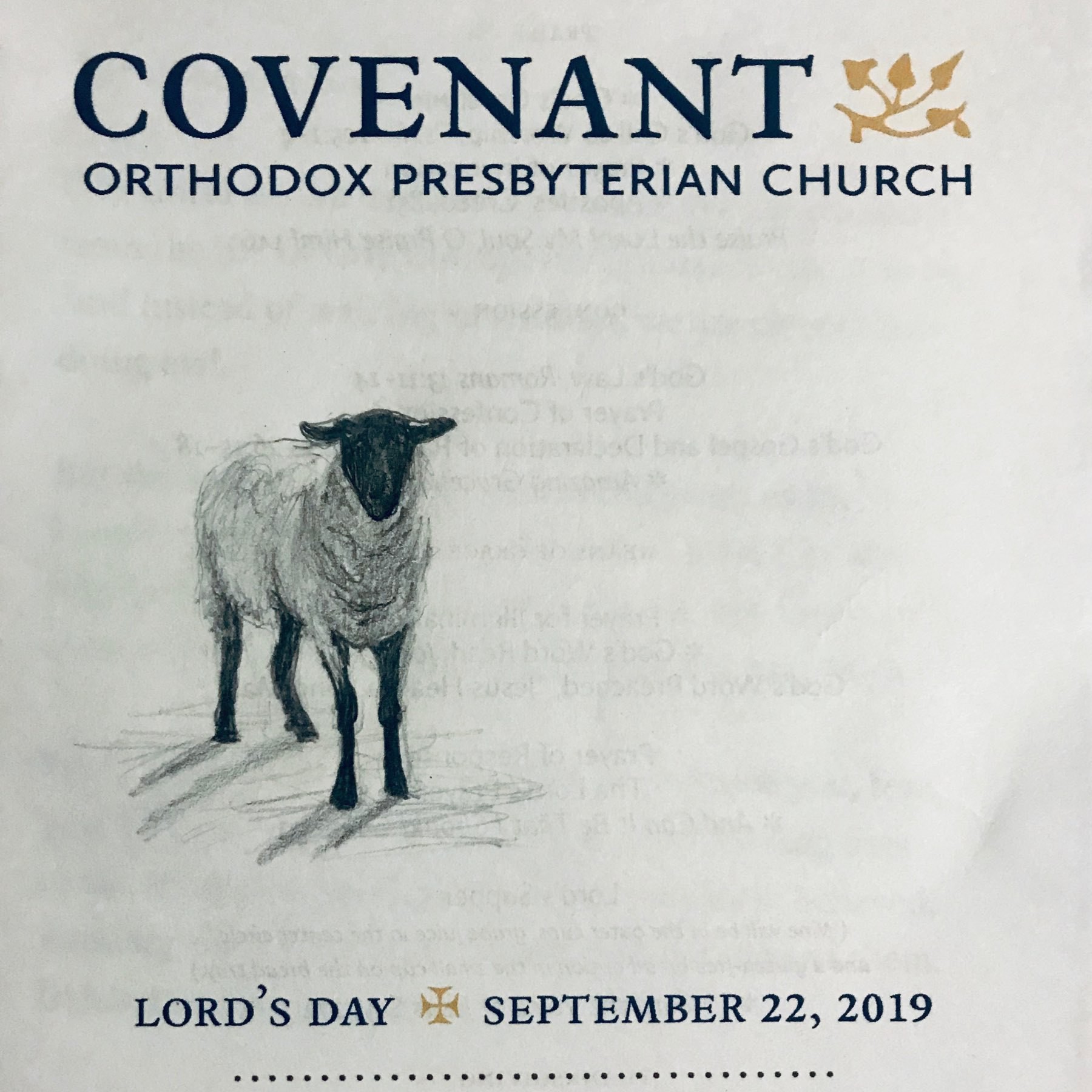✍🏻 @Dellachelpkaart’s peaceful meditation on the 23rd Psalm, which I preached last night. “The LORD is my shepherd; I shall not want.”

❤️ this picture of my daughter in front of a giant moon. @dellachelpkaArt made it with charcoal!
📚 Read The Whole Systems Approach by Bill and Cindy Adams. Great book! It helped me to better see the systems that comprise organizations. I feel more equipped to serve in various contexts after reading this book.
Going Deeper is designed to help you mature in Christ through
- twice per month, in-person classes
- a weekly online reading group
Attending Going Deeper will help you grow in your thinking as a Christian so that you may love more deeply and walk more wisely, “fully assured of the will of God” (Colossians 4:12), which is important.
You can join the classes, the reading group, or both. Both are free and you can join anytime. Regular attenders will become familiar with large portions of Reformed systematic theology.
Twice-monthly Classes
The best part of Going Deeper are the in-person classes. We meet from 6:00pm-7:30pm on the second and fourth Wednesdays of the month in central Tucson: 3131 N. Country Club Rd, suite 209.
Each class focuses on a different aspect of the Christian faith. Through prayer, study, and discussion, we consider the Bible’s teachings and the implications for our faith and life in Christ. Our time is divided into four parts based on a model I learned from Michael Horton.
- Drama. We will begin by remembering a few of God’s works and note their connection to his larger plan of redemption.
- Doctrine. I will teach 1-2 important doctrines related to the theme, paying careful attention to note the essential distinctions and priorities that Scripture makes. The live-lectures will be available only in class.
- Doxology. We will sing to God in response to what we have heard and then prayer together along the lines of our theme.
- Discipleship. We’ll discuss how what we’ve learned applies to our personal walks in the Lord as well as our life together.
Weekly Online Reading Group
Those who would like to supplement the classes, or who are unable to attend them, can join the online reading group where we discuss sections from Michael Horton’s, Pilgrim Theology: Core Doctrines for Christian Disciples.
The reading group meets on Thursdays from 12:30-1:00pm at https://meet.jit.si/goingdeeper. If for some reason I can’t attend the reading group on a particular day, I’ll mention it on my blog and encourage you to still meet with any others who’d like to discuss.
Participants are required only to finish the assigned reading from Pilgrim Theology before the reading group meets.
| Date | Assigned Page Numbers |
|---|---|
| 10/3 | 25-36 |
| 10/10 | 36-50 |
| 10/17 | 51-62 |
| 10/24 | 62-71 |
Starting next Wednesday, I will be teaching a micro-class called Covenant Life. We’ll meet twice: on 9/18 and 10/2 from 6:00-7:30pm at 3131 N. Country Club Rd, suite 209.
Who Should Come
- Anyone desiring or exploring church membership at Covenant should attend.
- Anyone who would like to hear a fresh overview of what God is doing at Covenant and how you can be a part of that.
- Your children! I want to talk a little with your kiddos too about what it means for them to be members of the church along with their parents. Childcare will be provided for the remainder of the class.
What You’ll Learn
- why we have church membership
- the expectations of church membership
- our doctrinal distinctives
- why we worship the way we do
- how our church is run
- the history of our church
- how to grow as a disciple at Covenant
I’ll also provide interesting readings for you and opportunities to ask your questions.
This is a great opportunity to find out what it means to follow Jesus with us at Covenant. I hope you will come and bring a friend.
📚 Read: Catholicism Made Me Protestant by Onsi A. Kamel in First Things
🇭🇰 There are so many remarkable things about the protests in Hong Kong.
🎨 Maybe a tenth of the whole mural at Olé Mexican Grill. Who painted this? It’s so fun.

⛪️ In John 7, John says that the Holy Spirit had not come because Jesus was not yet glorified. What did he mean and why is this important? Today, I jam packed a long morning sermon with answers to these questions.
A lady recently commissioned my wife to paint a helmet for her foster daughter. As usual, Della poured her heart into her painting and it turned out beautifully, including this amazing and famous verse 14a from Psalm 139.
I praise you, for I am fearfully and wonderfully made. (ESV)
אוֹדְךָ עַל כִּי נוֹרָאוֹת נִפְלֵיתִי (HMT)
While the helmet work was in progress, Della showed the painted verse to a friend who asked us what we thought the verse meant. In particular, she wondered, “What does it mean that we are fearfully made?”
Or, to put it another way, how should this little girl think about herself when she wears her helmet? How should other people think about her when they see her and her verse?
Part of the difficulty of understanding this verse comes from the translation I copied above and others like it. This translation tends to focus our attention on the verb made, which does not have an equivalent Hebrew word in the original but added for clarity. The result is that it seems to suggest that God was filled with fear and wonder when he made us, but that’s not what this verse means.
It might help to know that the phrase fearfully and wonderfully made is translated from only two words.
- נוֹרָאוֹת is a participle working like an adjective that means fearfully.
- נִפְלֵיתִי is a verb with a passive sense that means made to be distinct.
Because of the nature of the second word, the verb, fearfully, is less about God’s making and more about what he has made. So I’d suggest this as a better translation:
“I praise you because I am a made fearfully distinct.”
For this translation, I was helped by O. T. scholars Bruce Waltke and Erike Moore, who suggest “fearfully extraordinary” as another possible translation.
But now that we know how fearfully works grammatically, what does it mean?
This might help: Think about what you would mean if you entered a room and said that it was “fearfully dark”. You would not be describing the actions of the room or the actions of darkness, but how something about the darkness of the room made you feel fear. Something similar to that is going on here. Verse 14 isn’t saying that God was afraid when he made David, but that David felt a sense of fear when he considered his amazing body that God had made.
But why be afraid? It’s because what David felt was more than just shaking in his boots. In other parts of the Bible, for example, instead of “fearful” translators will use the word “awesome”. Here’s one example:
When you did awesome things that we did not look for, when you came down the mountains quaked at your presence. (Isaiah 64:3)
This particular fear that David felt has a longer name, in the Bible. It’s called the fear of the LORD, or the fear of Yahweh. And the fear of Yahweh is a bigger idea and feeling than just being afraid.
The fear of Yahweh is a combination of reverence, awe, fear, and love for God whenever his awesome power settles into our consciousness. It’s the feeling you get when you stand on the edge of his Grand Canyon or under his galaxies and stars on a dark night. It’s the feeling you get when you consider that God became man to die for sinners like you and me. And it is the feeling you get when you stop, as David did, and think deeply about what God did when he gave you your amazing body.
Reflecting on our bodies in this Godward way is good for so many reasons.
- It combats our tendency to serve and love creation (idolatry) more than the Creator.
- It teaches us to deeply value ourselves and each other as the amazing creations we are; just like these foster parents are doing for this little girl in this difficult moment in her young life.
- And reflecting on our bodies in this way, also multiplies our love for God. We see an example of that at the end of this verse. David’s reflection on God’s work in making his body leads David to conclude that all God’s “works are wonderful and that his soul knows it very well.”
It makes me smile to think that this little girl gets to walk around with this particular verse on her head.
You may not get to wear a crown like hers, but you do have an amazing body made by the almighty God. And when you understand the story of God, the world, and you, you’ll learn to praise and fear him for it, just like David did.
Here’s some more of Psalm 139:
For you formed my inward parts; you knitted me together in my mother’s womb. I praise you, for I am fearfully and wonderfully made. Wonderful are your works; my soul knows it very well. My frame was not hidden from you, when I was being made in secret, intricately woven in the depths of the earth. Your eyes saw my unformed substance; in your book were written, every one of them, the days that were formed for me, when as yet there was none of them.
Read the whole Psalm at esv.org.
📕 You can now get a PDF of the Trinity Psalter Hymnal. Very handy.
📚 In another translation gift from David Noe, Beza writes a fervent letter to a Polish prince about the Trinity and against those who were leading people astray.
🧘♂️ Mindfulness is Loaded with (Troubling) Metaphysical Assumptions by Sahanika Ratnayake is spot on. Ed Clowney wouldn’t disagree, and he goes further by explaining how the metaphysical support for the (good) assumptions Ratnayake makes is found in Christian theology.
🎯 Kevin Vanhoozer explains the goal of doctrine:
The goal of doctrine is to help people understand the story of which they are a part—the drama of redemption—so well that they know what to say and do to correspond and continue it, even though the cultural scenery has changed.
📚 Finished: Scaling Leadership by Robert Anderson and William Adams. It’s very similar to Mastering Leadership and better in a few ways.
🤔 Think about this: Jesus is one person with two natures. You can understand what that means by considering how the Bible says Jesus knows or doesn’t know certain things.
📚 Kevin Vanhoozer has a lot of great ways of explaining the connection between doctrine and discipleship in his new book for pastors. Loved it.


